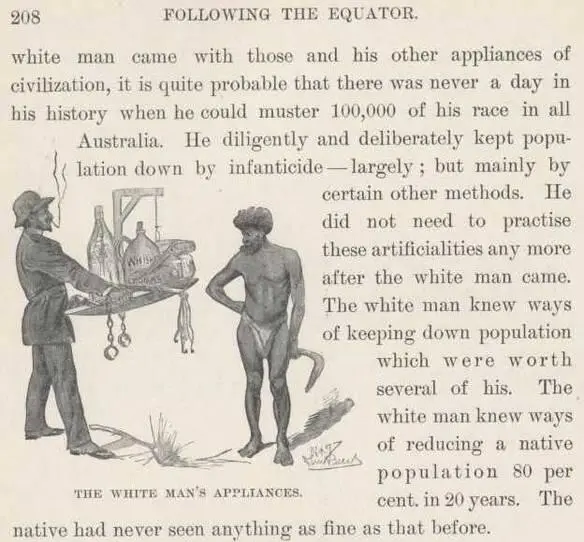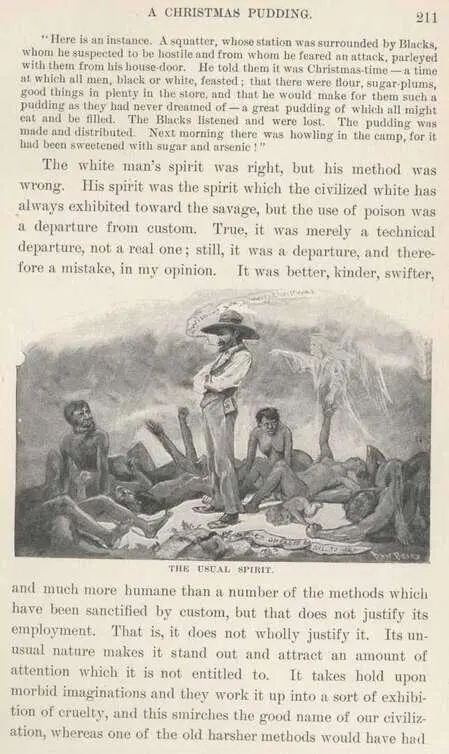Mark Twain - Following the Equator
Здесь есть возможность читать онлайн «Mark Twain - Following the Equator» весь текст электронной книги совершенно бесплатно (целиком полную версию без сокращений). В некоторых случаях можно слушать аудио, скачать через торрент в формате fb2 и присутствует краткое содержание. Год выпуска: 2004, Жанр: Классическая проза, Юмористическая проза, на английском языке. Описание произведения, (предисловие) а так же отзывы посетителей доступны на портале библиотеки ЛибКат.
- Название:Following the Equator
- Автор:
- Жанр:
- Год:2004
- ISBN:нет данных
- Рейтинг книги:3 / 5. Голосов: 1
-
Избранное:Добавить в избранное
- Отзывы:
-
Ваша оценка:
- 60
- 1
- 2
- 3
- 4
- 5
Following the Equator: краткое содержание, описание и аннотация
Предлагаем к чтению аннотацию, описание, краткое содержание или предисловие (зависит от того, что написал сам автор книги «Following the Equator»). Если вы не нашли необходимую информацию о книге — напишите в комментариях, мы постараемся отыскать её.
Following the Equator — читать онлайн бесплатно полную книгу (весь текст) целиком
Ниже представлен текст книги, разбитый по страницам. Система сохранения места последней прочитанной страницы, позволяет с удобством читать онлайн бесплатно книгу «Following the Equator», без необходимости каждый раз заново искать на чём Вы остановились. Поставьте закладку, и сможете в любой момент перейти на страницу, на которой закончили чтение.
Интервал:
Закладка:

For example, there is the case of the country now called Victoria—a country eighty times as large as Rhode Island, as I have already said. By the best official guess there were 4,500 aboriginals in it when the whites came along in the middle of the 'Thirties. Of these, 1,000 lived in Gippsland, a patch of territory the size of fifteen or sixteen Rhode Islands: they did not diminish as fast as some of the other communities; indeed, at the end of forty years there were still 200 of them left. The Geelong tribe diminished more satisfactorily: from 173 persons it faded to 34 in twenty years; at the end of another twenty the tribe numbered one person altogether. The two Melbourne tribes could muster almost 300 when the white man came; they could muster but twenty, thirty-seven years later, in 1875. In that year there were still odds and ends of tribes scattered about the colony of Victoria, but I was told that natives of full blood are very scarce now. It is said that the aboriginals continue in some force in the huge territory called Queensland.
The early whites were not used to savages. They could not understand the primary law of savage life: that if a man do you a wrong, his whole tribe is responsible—each individual of it—and you may take your change out of any individual of it, without bothering to seek out the guilty one. When a white killed an aboriginal, the tribe applied the ancient law, and killed the first white they came across. To the whites this was a monstrous thing. Extermination seemed to be the proper medicine for such creatures as this. They did not kill all the blacks, but they promptly killed enough of them to make their own persons safe. From the dawn of civilization down to this day the white man has always used that very precaution. Mrs. Campbell Praed lived in Queensland, as a child, in the early days, and in her "Sketches of Australian life," we get informing pictures of the early struggles of the white and the black to reform each other.
Speaking of pioneer days in the mighty wilderness of Queensland, Mrs. Praed says:
"At first the natives retreated before the whites; and, except that they every now and then speared a beast in one of the herds, gave little cause for uneasiness. But, as the number of squatters increased, each one taking up miles of country and bringing two or three men in his train, so that shepherds' huts and stockmen's camps lay far apart, and defenseless in the midst of hostile tribes, the Blacks' depredations became more frequent and murder was no unusual event.
"The loneliness of the Australian bush can hardly be painted in words. Here extends mile after mile of primeval forest where perhaps foot of white man has never trod—interminable vistas where the eucalyptus trees rear their lofty trunks and spread forth their lanky limbs, from which the red gum oozes and hangs in fantastic pendants like crimson stalactites; ravines along the sides of which the long-bladed grass grows rankly; level untimbered plains alternating with undulating tracts of pasture, here and there broken by a stony ridge, steep gully, or dried-up creek. All wild, vast and desolate; all the same monotonous gray coloring, except where the wattle, when in blossom, shows patches of feathery gold, or a belt of scrub lies green, glossy, and impenetrable as Indian jungle.
"The solitude seems intensified by the strange sounds of reptiles, birds, and insects, and by the absence of larger creatures; of which in the day-time, the only audible signs are the stampede of a herd of kangaroo, or the rustle of a wallabi, or a dingo stirring the grass as it creeps to its lair. But there are the whirring of locusts, the demoniac chuckle of the laughing jack-ass, the screeching of cockatoos and parrots, the hissing of the frilled lizard, and the buzzing of innumerable insects hidden under the dense undergrowth. And then at night, the melancholy wailing of the curlews, the dismal howling of dingoes, the discordant croaking of tree-frogs, might well shake the nerves of the solitary watcher."
That is the theater for the drama. When you comprehend one or two other details, you will perceive how well suited for trouble it was, and how loudly it invited it. The cattlemen's stations were scattered over that profound wilderness miles and miles apart—at each station half a dozen persons. There was a plenty of cattle, the black natives were always ill-nourished and hungry. The land belonged to them. The whites had not bought it, and couldn't buy it; for the tribes had no chiefs, nobody in authority, nobody competent to sell and convey; and the tribes themselves had no comprehension of the idea of transferable ownership of land. The ousted owners were despised by the white interlopers, and this opinion was not hidden under a bushel. More promising materials for a tragedy could not have been collated. Let Mrs. Praed speak:
"At Nie Nie station, one dark night, the unsuspecting hut-keeper, having, as he believed, secured himself against assault, was lying wrapped in his blankets sleeping profoundly. The Blacks crept stealthily down the chimney and battered in his skull while he slept."
One could guess the whole drama from that little text. The curtain was up. It would not fall until the mastership of one party or the other was determined—and permanently:
"There was treachery on both sides. The Blacks killed the Whites when they found them defenseless, and the Whites slew the Blacks in a wholesale and promiscuous fashion which offended against my childish sense of justice.
"They were regarded as little above the level of brutes, and in some cases were destroyed like vermin.
"Here is an instance. A squatter, whose station was surrounded by Blacks, whom he suspected to be hostile and from whom he feared an attack, parleyed with them from his house-door. He told them it was Christmas-time—a time at which all men, black or white, feasted; that there were flour, sugar-plums, good things in plenty in the store, and that he would make for them such a pudding as they had never dreamed of—a great pudding of which all might eat and be filled. The Blacks listened and were lost. The pudding was made and distributed. Next morning there was howling in the camp, for it had been sweetened with sugar and arsenic!"

The white man's spirit was right, but his method was wrong. His spirit was the spirit which the civilized white has always exhibited toward the savage, but the use of poison was a departure from custom. True, it was merely a technical departure, not a real one; still, it was a departure, and therefore a mistake, in my opinion. It was better, kinder, swifter, and much more humane than a number of the methods which have been sanctified by custom, but that does not justify its employment. That is, it does not wholly justify it. Its unusual nature makes it stand out and attract an amount of attention which it is not entitled to. It takes hold upon morbid imaginations and they work it up into a sort of exhibition of cruelty, and this smirches the good name of our civilization, whereas one of the old harsher methods would have had no such effect because usage has made those methods familiar to us and innocent. In many countries we have chained the savage and starved him to death; and this we do not care for, because custom has inured us to it; yet a quick death by poison is loving kindness to it. In many countries we have burned the savage at the stake; and this we do not care for, because custom has inured us to it; yet a quick death is loving kindness to it. In more than one country we have hunted the savage and his little children and their mother with dogs and guns through the woods and swamps for an afternoon's sport, and filled the region with happy laughter over their sprawling and stumbling flight, and their wild supplications for mercy; but this method we do not mind, because custom has inured us to it; yet a quick death by poison is loving kindness to it. In many countries we have taken the savage's land from him, and made him our slave, and lashed him every day, and broken his pride, and made death his only friend, and overworked him till he dropped in his tracks; and this we do not care for, because custom has inured us to it; yet a quick death by poison is loving kindness to it. In the Matabeleland today—why, there we are confining ourselves to sanctified custom, we Rhodes-Beit millionaires in South Africa and Dukes in London; and nobody cares, because we are used to the old holy customs, and all we ask is that no notice—inviting new ones shall be intruded upon the attention of our comfortable consciences. Mrs. Praed says of the poisoner, "That squatter deserves to have his name handed down to the contempt of posterity."
Читать дальшеИнтервал:
Закладка:
Похожие книги на «Following the Equator»
Представляем Вашему вниманию похожие книги на «Following the Equator» списком для выбора. Мы отобрали схожую по названию и смыслу литературу в надежде предоставить читателям больше вариантов отыскать новые, интересные, ещё непрочитанные произведения.
Обсуждение, отзывы о книге «Following the Equator» и просто собственные мнения читателей. Оставьте ваши комментарии, напишите, что Вы думаете о произведении, его смысле или главных героях. Укажите что конкретно понравилось, а что нет, и почему Вы так считаете.











